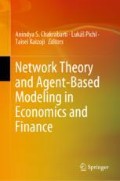Abstract
This chapter explores the optimal income tax audit strategies from a social planner’s perspective, whose objective is to minimize the aggregated tax evasion of a given society. Agents live in a social-cohesive network with homophilic linkages, meaning individuals connect only with people who are akin to them. Further, each period individuals share their memories about past audits and consequently update their subjective probability of being audited. The Tax Agency finds that network-based audit policies are inefficient, in the sense that they are just as good as random. Thus, the social planner credibly announces that, from now on, audit rates will be linearly proportionate to the agent’s income, making richer people more prone of being audited. Audit rates are now endogenous and heterogeneous among agents, making it possible for the Tax Agency to find an optimal network-based policy following a local-average strategy where a “key sector” of society is predominantly audited every period. Following this strategy, under a dynamic framework, the Nash Equilibrium for the average subjective audit rate is swiftly raised after just a few fiscal years. The enhanced subjective audit rate, in turn, unfolds as a larger tax revenue collection and a significant deterrence of income tax evasion.
This project has received funding from the ITN ExSIDE European Union’s Horizon 2020 research and innovation programme under the Marie Sklodowska-Curie grant agreement No. 721846.
Access this chapter
Tax calculation will be finalised at checkout
Purchases are for personal use only
Notes
- 1.
The score is computed by subtracting the benchmark value from the strategy’s outcome and diving by the same benchmark value: \( \Delta = \frac{ \hat{p}\,-\,\hat{p}_{BM}}{\hat{p}_{BM}} \); analogous for all \(\Delta \)–columns.
- 2.
For a more extensive discussion refer to Ushchev and Zenou (2018).
References
Allingham MG, Sandmo A (1972) Income tax evasion: a theoretical analysis. J Public Econ 1(3–4):323–338
Alm J, Bloomquist KM, McKee M (2017) When you know your neigh- bour pays taxes: information, peer effects, and tax compliance (Working Paper Series No. 6775). Victoria University of Wellington, Chair in Public Finance
Andrei AL, Comer K, Koehler M (2014) An agent-based model of network effects on tax compliance and evasion. J Econ Psychol 40(C):119–133
Ballester C, Calvó-Armengol A, Zenou Y (2006) Who’s who in networks. Wanted: The key player. Econometrica 74(5):1403–1417
Becker GS (1968) Crime and punishment: an economic approach. J Polit Econ 76:169
Billari F, Diaz BA, Fent T, Prskawetz A (2007) The “wedding-ring”. Demogr Res 17(3):59–82
Bonacich P (1987) Power and centrality: a family of measures. Am J Sociol 92:1170–1182
Garcia Alvarado F (2019) Network effects in an agent-based model of tax evasion with social influence. In: Demazeau Y, Matson E, Corchado JM, de la Prieta F (eds) Advances in practical applications of survivable agents and multi- agent systems (chap. Forthcoming). Springer LNAI
Hokamp S, Pickhardt M (2010) Income tax evasion in a society of heterogeneous agents—evidence from an agent-based model. Int Econ J 24(4):541–553
Korobow A, Johnson C, Axtell R (2007) An agent-based model of tax compliance with social networks. Natl Tax J 60(3):589–610
Luttmer EFP, Singhal M (2014) Tax morale. J Econ Perspect 28(4):149–168
Mittone L (2006) Dynamic behaviour in tax evasion: an experimental approach. J Behav Exp Econ (formerly The Journal of Socio-Economics) 35(5):813–835
Mittone L, Patelli P (2000) Imitative behaviour in tax evasion (Economic simulations in swarm: agent-based modelling and object oriented programming)
Myles G, Naylor R (1996) A model of tax evasion with group conformity and social customs. Eur J Polit Econ 12(1):49–66
Patacchini E, Zenou Y (2012) Juvenile delinquency and conformism. J Law Econ Organ 28(1):1–31
Tversky A, Kahneman D (1973) Availability: a heuristic for judging frequency and probability. Cogn Psychol 5:207–232
Ushchev P, Zenou Y (2018) Social norms in networks. SSRN Electron J
Author information
Authors and Affiliations
Corresponding author
Editor information
Editors and Affiliations
Rights and permissions
Copyright information
© 2019 Springer Nature Singapore Pte Ltd.
About this chapter
Cite this chapter
Garcia Alvarado, F. (2019). Network-Based Policies Versus Tax Evasion. In: Chakrabarti, A., Pichl, L., Kaizoji, T. (eds) Network Theory and Agent-Based Modeling in Economics and Finance. Springer, Singapore. https://doi.org/10.1007/978-981-13-8319-9_20
Download citation
DOI: https://doi.org/10.1007/978-981-13-8319-9_20
Published:
Publisher Name: Springer, Singapore
Print ISBN: 978-981-13-8318-2
Online ISBN: 978-981-13-8319-9
eBook Packages: Economics and FinanceEconomics and Finance (R0)

